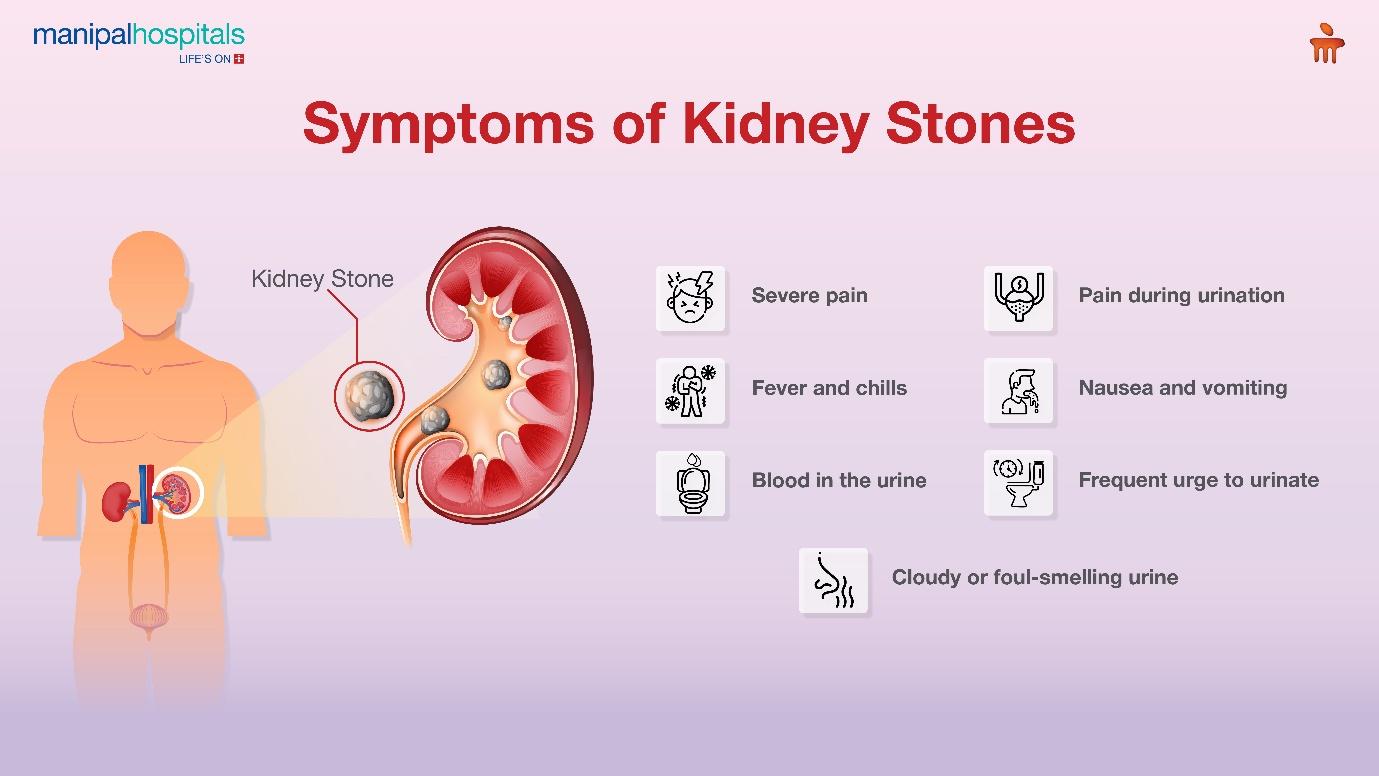
Kidney stones are a common and painful urological condition that affects millions worldwide. These hard deposits form in the kidneys and cause intense discomfort when passing through the urinary tract. Understanding kidney stone symptoms is essential for early detection and prompt treatment, potentially preventing complications and severe pain. Let us explore the key symptoms, types, and causes of kidney stones, besides reviewing the effective treatment options available. However, before we delve into the symptoms of kidney stones, let us understand what kidney stones are.
Synopsis
Kidney stones are hard mineral and salt deposits that form inside the kidneys. They develop when urine becomes concentrated, allowing minerals to crystallise and stick together. Kidney stones are a common urological issue that can cause sharp, intense pain when moving through the urinary tract.
What are the common Kidney Stone Symptoms?

The symptoms of kidney stones often depend on the stone’s size and its location within the urinary tract. In many cases, symptoms do not appear until the stone begins to move inside the kidney or enters the ureter—the narrow tube linking the kidney to the bladder. When this happens, common signs may include:
-
Sharp Pain: Intense, stabbing, or cramp-like pain in the back, side, or lower belly, often occurring in waves and fluctuating in severity
-
Burning Sensation: Pain or burning sensation during urination, indicating that the stone has reached the junction between the bladder and ureter
-
Blood in Urine: Haematuria is a condition that makes the urine appear pink, red, or brown due to the presence of blood.
-
Cloudy & Foul Smell: This may indicate an underlying infection in the urinary tract.
-
Frequent Urination: The urge to urinate now and then, especially if the stone is located near the bladder
-
Nausea and Vomiting: This is caused by the body’s response to severe pain or a blocked urinary tract
-
Fever and Chills: These are the signs of an infection that require immediate medical attention
What causes Kidney Stones?
Understanding what leads to kidney stone formation is essential for prevention. Several factors contribute to what causes kidney stones:
-
Inadequate fluid intake – When you do not drink enough water, your urine becomes concentrated. This makes stones more likely to develop.
-
Unbalanced diet – Excessive consumption of salt, sugar, animal protein, or oxalate-rich foods (e.g., spinach and nuts) can promote stone development.
-
Medical conditions – Disorders like gout, hyperparathyroidism, and frequent urinary tract infections can contribute to kidney stone development
-
Family history – If kidney stones run in your family, your risk of developing them is significantly higher
-
Obesity - excess body weight has been linked to increased stone formation
Types of Kidney Stones
There are different types of kidney stones, each formed due to different underlying factors:
-
Calcium Stones
The most common type of stone, often made of calcium oxalate and influenced by diet and metabolic disorders
-
Struvite Stones
Typically linked to urinary tract infections, these stones tend to form rapidly and can grow to a substantial size
-
Uric Acid Stones
More common in dehydrated people, who have gout, or consume a high-protein diet
-
Cystine Stones
Rare and typically hereditary stones resulting from a genetic disorder that causes cystine to leak into the urine
Kidney Stones Treatment
The treatment approach for kidney stones depends on their size, type, and where they are located in the urinary tract. Depending on severity and stone type, kidney stone treatment may include:
-
Hydration and Pain Management
Small stones may flush out naturally with increased fluid intake and over-the-counter pain relievers
-
Medications
Alpha-blockers help ease the passage of stones by relaxing the muscles of the ureter, reducing pain and facilitating movement
-
Extracorporeal Shock Wave Lithotripsy (ESWL)
A non-surgical technique that uses shock waves to fragment kidney stones into smaller, passable pieces
-
Ureteroscopy
A slender scope is passed through the urethra into the bladder to locate and either remove or fragment the stones
-
Percutaneous Nephrolithotomy
A surgical option for large stones involves a small incision in the back to remove the stone directly
-
Parathyroid surgery (if required)
For stones caused by overactive parathyroid glands, surgical correction may be necessary
How to Prevent Kidney Stones
Although it is not always possible to prevent kidney stones, you can lower your risk by:
-
Staying well-hydrated by drinking at least 2–3 litres of water daily
-
Limiting consumption of salt and animal-based proteins
-
Avoiding high-oxalate foods if one is prone to calcium oxalate stones
-
Controlling long-term health issues like obesity and diabetes
-
Regular imaging and urine tests help prevent recurrence and guide long-term management
FAQ's
Diagnosis is usually made through imaging tests like an ultrasound, CT scan, or X-ray, along with urine and blood tests.
While not usually life-threatening, untreated stones can cause infections, kidney damage, or block the flow of urine, making timely treatment important.
Yes, some people are prone to recurring stones. Lifestyle changes, dietary adjustments, and medications can help prevent recurrence.
Yes, though less common, kidney stones can occur in children due to genetics, diet, or underlying medical issues.
Not usually, but if left untreated, large stones or repeated infections can damage the kidneys over time.






















 5 Min Read
5 Min Read

.png)












